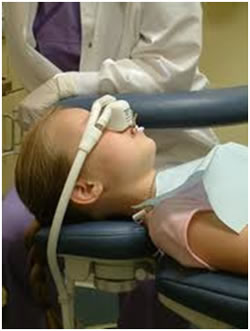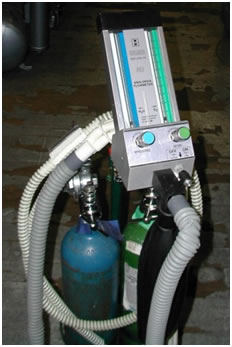Nitrous Oxide-Oxygen Sedation
 Some children are given nitrous oxide/oxygen to relax them for their dental treatment. Nitrous oxide/oxygen is a blend of two gases, oxygen and nitrous oxide. Nitrous oxide/oxygen is given through a small breathing mask which is placed over the child’s nose, allowing them to relax, but without putting them to sleep. The American Academy of Pediatric Dentistry, recognizes nitrous oxide/oxygen inhalation as a very safe and effective technique to reduce anxiety, produce analgesia, and enhance effective communication between a patient and dentist. The gas is a slightly sweet-smelling, colorless and mild, easily taken inert gas, then with normal breathing, it is quickly eliminated from the body. It is non-addictive. While inhaling nitrous oxide/oxygen, your child remains fully conscious and keeps all natural reflexes.
Some children are given nitrous oxide/oxygen to relax them for their dental treatment. Nitrous oxide/oxygen is a blend of two gases, oxygen and nitrous oxide. Nitrous oxide/oxygen is given through a small breathing mask which is placed over the child’s nose, allowing them to relax, but without putting them to sleep. The American Academy of Pediatric Dentistry, recognizes nitrous oxide/oxygen inhalation as a very safe and effective technique to reduce anxiety, produce analgesia, and enhance effective communication between a patient and dentist. The gas is a slightly sweet-smelling, colorless and mild, easily taken inert gas, then with normal breathing, it is quickly eliminated from the body. It is non-addictive. While inhaling nitrous oxide/oxygen, your child remains fully conscious and keeps all natural reflexes.
1. What is nitrous oxide/oxygen?
This is a type of mild dental sedation where a blend of two gases - nitrous oxide and oxygen is used. It is delivered via a nasal mask and enters the system through the lungs. At the end of each treatment, it is eliminated after a short period of breathing oxygen, and has no lingering effects.

Nitrous oxide/oxygen systems
2. How will my child feel when breathing nitrous oxide/oxygen?
Your child will smell a sweet, pleasant aroma and experience a sense of well-being and relaxation. Since it produces a feeling of giddiness or euphoria, it is commonly called “laughing gas”. It has the effect of raising the pain threshold and may even make the time appear to pass quickly. This type of sedation is indicated for a child who is worried by the sights, sounds or sensations of dental treatment.
 3. How safe is nitrous oxide/oxygen?
3. How safe is nitrous oxide/oxygen?
Very safe. Nitrous oxide/oxygen is perhaps the safest sedative in dentistry.
It has the following qualities: it is well tolerated, not addictive, has quick onset, is reversible, can be adjusted in various concentrations, and is non-allergic. Your child remains fully conscious- keeps all natural reflexes- when breathing nitrous oxide/ oxygen.
4. Are there any special instructions for nitrous oxide/ oxygen?
First, for this type of sedation to be effective, your child must not eat any food at least 3 hours before the dental visit. Occasionally, nausea and vomiting occurs when a child has a full stomach. Second, inform your dentist about any respiratory condition for your child, as it may limit the effectiveness of nitrous oxide/oxygen. Third, inform your dentist if your child is taking any medication on the day of the appointment.
5. Will nitrous oxide/oxygen work for all children?
Since all children are not alike, every service is tailored to your child as an individual. Nitrous oxide/oxygen may not be effective for some children, especially those who have severe anxiety, nasal congestion, or discomfort wearing a nasal mask. The dentist will review your child’s medical history and inform you if nitrous oxide/oxygen is recommended for your child.
The objectives of nitrous oxide/oxygen inhalation include:
- reduce or eliminate anxiety,
- reduce untoward movement and reaction to dental treatment,
- enhance communication and patient cooperation,
- raise the pain reaction threshold,
- increase tolerance for longer appointments,
- aid in treatment of the mentally/physically disabled or medically compromised patient,
- reduce gagging,
- potentiate the effect of sedatives.
Prior to your appointment:
- Please inform us of any change to your child’s health and/or medical condition.
- Tell us about any respiratory condition that makes breathing through the nose difficult for your child. It may limit the effectiveness of the nitrous oxide/oxygen.
- Let us know if your child is taking any medication on the day of the appointment.
Sources
http://www.aapd.org/media/Policies_Guidelines/G_Nitrous.pdf 2011-2012
Murray Dock. Pharmacologic management of patient behavior. In: Dean JA, Avery DR, McDonald RE. Dentistry for the child and adolescent. St. Louis, Mosby Elsevier, 9th ed., 2011, p:253-276





